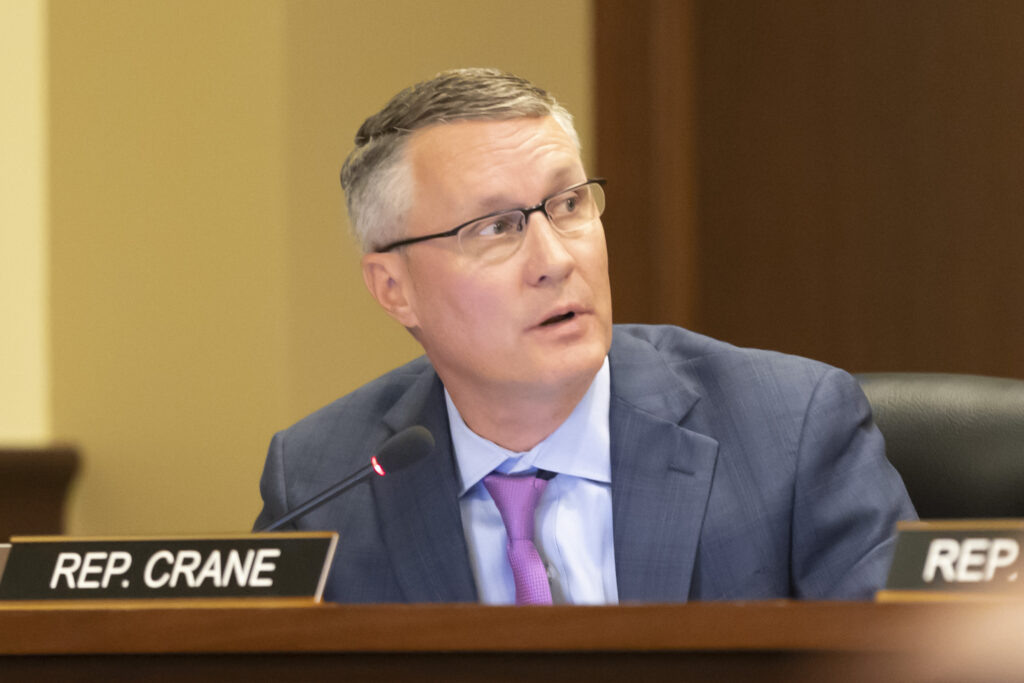Bills eliminating rape and incest exceptions and bills targeting contraception, IUDs in the works for 2023 legislative session
By Kelcie Moseley-Morris / Idaho Capital Sun / July 13, 2022
On the day the U.S. Supreme Court released its decision to overturn Roe v. Wade and return the regulation of abortion rights to the states, Idaho Family Policy Center President Blaine Conzatti told the Idaho Capital Sun that he was overjoyed, but that the work was not yet done.
The Idaho Family Policy Center is a 501(c)(3) nonprofit that has helped draft and pass several anti-abortion bills, including Idaho’s trigger ban on nearly all abortions as well as a law modeled after legislation in Texas allowing individuals to sue medical professionals who provide an abortion.
Other anti-abortion individuals and groups have also been thinking about their next battles in the weeks since the court issued its ruling. While the Supreme Court’s action was a significant victory that activists have worked toward for years, Conzatti and some incoming members of the Idaho Legislature are now focusing on what’s next.
“I’ve been watching the various Supreme Court cases come out and trying to figure out what opportunities we have in the state legislatively, and I’m pretty excited about those opportunities,” Conzatti said.
For him, those opportunities so far include banning emergency contraception and IUDs, removing the affirmative defenses for rape and incest from Idaho’s abortion ban law, and placing limits on businesses or others who attempt to pay for a person to travel for an abortion.
Under the federal Emergency Medical Treatment and Active Labor Act, health care providers who determine a patient needs an abortion because of a medical emergency are protected regardless of state law. Those medical conditions could include ectopic pregnancy, pregnancy loss complications, or preeclampsia, according to previous States Newsroom reporting.
Removing the rape and incest exceptions is not an idea Conzatti sees as going very far with the Idaho Legislature, even as more conservative candidates will be seated in the state Senate by January. Many of the legislators are members of The Church of Jesus Christ of Latter-day Saints, which has allowed for those exceptions in its doctrine regarding abortion.
“That’s probably going to be a long-term educational effort to convince LDS legislators that we never punish a child for the sins of the father, and no matter the circumstances of birth, every child deserves equal protection of the law,” Conzatti said.
On the subject of contraception, Conzatti said there’s no evidence that monthly birth control pills should be banned, but said emergency contraception and IUDs go a step too far because fertilization can still occur. The International Planned Parenthood Federation disagrees with the classification of IUDs as a device that causes abortions.
“Anything that can end life after conception is problematic,” he said.
Restricting interstate travel for abortion could be unconstitutional, policy center director says
According to the Washington Post, the National Association of Christian Lawmakers has started to work on model legislation that would restrict people from crossing state lines to get an abortion, but Conzatti said he isn’t sure about that idea.
“I don’t know how I feel about it. There are interesting constitutional questions,” he said.
Instead, Conzatti wants to stop businesses and others from “furnishing” an abortion, which he says he is modeling after other states that had similar laws on the books prior to the Roe v. Wade decision in 1973. Texas is one of those states, where it was a crime to perform or furnish the means for procuring an abortion prior to Roe.
Several businesses in Idaho have stated intentions to pay for employees to travel for an abortion, including Hewlett Packard Enterprise, Citigroup Inc. and Chobani.
Chobani, which employs more than 1,000 people in the Magic Valley, said it would cover expenses for employees who need to travel out of state or more than 100 miles for an abortion, cancer treatment, bariatric surgery and other special procedures, according to the Times-News.
“You want to talk about crazy dystopia, like, ‘Here, instead of us providing you with family leave and paying for your pregnancy and paying for all the accommodations that we’re going to have to offer after you give birth, we’re going to spend $5,000 and ship you out of state so that you can keep working for us,” Conzatti said. “It’s just bizarre stuff.”
Chobani provides six weeks of paid parental leave following the birth, adoption or foster care placement of a child after six months of employment, along with medical, dental and vision coverage.
According to the Idaho State Journal, Chobani President Kevin Burns said in an email to employees that he knows the issues are not without controversy or religious implications.
“We recognize that we have employees with strongly-held views on both sides of this issue and we respect the deeply-held beliefs on both sides,” Burns wrote. “For Chobani, this is not a political stance or posturing – it’s a reaffirmation of our core belief that we will strive to do what’s best for the safety, health and well-being of our employees and their families.”
House State Affairs chairman says next steps should be slow and deliberate
While new members of the Idaho Legislature next year will include Republicans in both chambers who are likely to support Conzatti’s proposals, there may not be as much appetite for some of those changes from those in leadership positions.
Rep. Brent Crane, R-Nampa, is chairman of the House State Affairs Committee and said he and Conzatti have not spoken about the bills Conzatti says he is drafting. Crane said he is committed to taking a measured approach to the issue and not messing with the trigger law too soon.
“We have a very robust trigger law, and there is some time that’s going to be needed to look at that and see if it’s good as it stands or if there are deficiencies,” Crane said. “I have talked to a number of legislators who feel like that is a solid position and would love to let this trigger law go into effect and see what happens.”
Crane says he’s been clear that he isn’t interested in banning contraception such as IUDs, but said the Legislature probably will have a conversation about emergency contraception, including Plan B.
While Crane has been chairman of the House State Affairs Committee for the past two years, he may not be selected as chairman again in the 2023 session. That will be up to leadership to decide.
As far as legislation restricting a person’s ability to travel for an abortion, Crane said Americans have a fundamental right to travel freely. But he is working with Stanton Healthcare and other groups to discuss how to provide more support and care after the birth of a child, including providing formula, diapers and other resources. He’s also working on legislation to help make the adoption process easier and more affordable. Conzatti expressed support for legislation on that subject as well.
But most importantly, Crane wants to proceed deliberately around what he called an emotional and sensitive issue.
“The advice I’ve been giving to lawmakers is, I think we need to proceed slowly with prudence and caution and care as we move forward,” Crane said. “Idaho has already made a policy statement on where they believe the line should be drawn, let’s put that in place and see if there’s any deficiencies.”
Sen. Patti Anne Lodge, R-Huston, will retire from the Legislature in December after more than 20 years, the last four of which she spent as chairwoman of the Senate State Affairs Committee. As chairwoman, Lodge drew criticism for holding some bills in committee, effectively killing them for the session. That has included several pieces of legislation Conzatti helped draft and push over the past two years.
A new chairperson of Senate State Affairs will be determined at the beginning of the 2023 legislative session.
Several incoming senators have publicly voiced far-right views on abortion
Perhaps more than any other, lawmakers in the next legislative session are likely to represent a broad spectrum of opinions, from left to the extreme right. While legislative seats won’t be finalized until after the general election in November, some Republicans have no opponents in the general election and others that do have opponents are still likely to win.
Scott Herndon, the Republican nominee for Senate in North Idaho, has said publicly that Idaho’s trigger bill should have treated abortion as homicide and has compared abortion to slavery, saying it is a human rights violation and a defilement of the image of God.
Herndon said in a video on Facebook that in the next legislative session he will introduce a bill making changes to Idaho’s trigger law. That will include taking out the exceptions for those who were victims of rape and incest. Under the existing law, those victims would have to prove they had filed a police report documenting the accusation, which can take weeks or months to obtain if it is an open investigation.
Herndon said in the video that those exceptions are “absolutely unjust” and give mothers a “free pass.”
“You don’t put to death the innocent child for the crime of its father, but that’s what this law would allow,” Herndon said. “… If a mother really wants to kill her child, she could lie, say she was raped, file a police report and go get her child killed in the state of Idaho and nobody would be prosecuted.”
Ben Toews, who won the Republican nomination for a Senate seat in the Coeur d’Alene area and is unopposed in the general election, is also a board member of the Idaho Family Policy Center. In a candidate survey, Toews said he is passionate about ending abortion in Idaho from conception.
“For too long we have allowed the most vulnerable in our society to be killed in the name of women’s rights or freedom of choice,” Toews wrote.
Glenneda Zuiderveld, the Republican nominee for a Senate seat in the Twin Falls area, posted on Facebook that the issue isn’t over.
“They can still (choose) the life of the mother over the baby,” Zuiderveld wrote. “Which is very rare, I can’t think of one woman who would (choose) her life over her child’s. Most women would sacrifice their lives for their children.”
Dan Foreman, a Republican who served one term in the Idaho Senate from 2016 to 2018, will face Senate Democrat David Nelson, D-Moscow, and Constitution candidate James Hartley in November. Foreman has written that his top issue is for Idaho to abolish the “unnecessary, harmful and wasteful curse of abortion,” and said he would also introduce legislation eliminating the rape and incest exceptions.
Other likely Idaho senators hold back on making more changes to abortion restrictions
Rep. Linda Wright Hartgen, R-Twin Falls, has a challenger in November from the Constitution Party named Paul Thompson, but said assuming she’s in the Legislature next session, she doesn’t see a need for removing the exceptions or going after contraception.
“The majority of the people that I talk to actually wish we’d just leave it alone. I think they like the exceptions for incest and rape, and obviously the health of the mother. Most of us have not walked in these people’s shoes, so it’s hard for us to know,” Hartgen said. “To the bottom of my toes, I am pro-life, but there’s just a few things there that I feel like the doctor and the mother and father need to give strong consideration to.”
Wright Hartgen said she’d like to see the Legislature focus on policy issues related to water and education. And she is of the mind that they should leave businesses alone and let them decide what they want to do for their employees.
Chris Trakel, who defeated Rep. Greg Chaney, R-Caldwell, for a Senate seat, will face Democratic challenger Toni Ferro and Constitution nominee Kurtis Berger. To Trakel, any type of abortion is murder, although there are justifiable defenses. He said he would be hard pressed to decide an abortion was acceptable because of rape or incest, but as a representative, he said he would listen to what his constituents wanted. The same is true for contraception, he said.
“I’m not here to push my opinions through and what I think is right,” Trakel said. “I want as much input as I can from other people, and when I don’t have that input, I go off my own principles and thoughts.”
Mountain Home resident Geoff Schroeder beat six-term incumbent Rep. Terry Gestrin, R-Donnelly, for a seat in the Senate. He is running unopposed in the general election, and is one of few Idaho Republicans who says he doesn’t think the government should be in the position of making medical decisions for people.
“My grandfather was a doctor, and there’s so many different situations, ranges of ages and medical history that are beyond the expertise of any legislator,” Schroeder said. “I don’t think it’s appropriate for us to weigh in, in advance of these things. It should be left to the doctor and the patient.”
He called the idea of the government regulating access to contraception absurd, and said he’s not in favor of regulating business in this area either.
“I am not in favor of the government interfering in contractual agreements between an employer and an employee,” Schroeder said.
Boise Democrats vow to continue fighting future legislation
While Republicans spar over upcoming abortion-related legislation, Sen. Melissa Wintrow, D-Boise, said she is focused on knocking on doors and talking to people across the state. Regardless of party affiliation, Wintrow said she is hearing from many Idahoans that they don’t like the direction of the state’s political landscape.
“I want folks out there, regardless of party, to vote for the person, not just the party,” Wintrow said. “I think there are a lot of people who feel that this is one bridge too far.”
Two college students who are working as interns for Wintrow are knocking doors with her and encouraging people to vote, even if it’s not for Wintrow.
Bryn Harris, a Boise High School graduate who is attending the University of California San Francisco, said people are going to have their religious beliefs, but it’s not their place to impose it on anyone else.
“This country was founded with the belief that there’s separation of church and state,” Harris said. “Especially regarding such a fundamental thing.”
Although Democrats remain a small minority — with just 19 of 105 seats — in the Idaho Legislature, Wintrow said she will keep fighting for personal freedoms and separation of church and state.
“It behooves no one to incorporate one religion into government,” Wintrow said. “We’ve seen where that’s gotten us before.”
FEATURED IMAGE: While the U.S. Supreme Court’s decision on Roe v. Wade was a significant victory, anti-abortion activists and some incoming members of the Idaho Legislature are now focusing on what restrictions could come next.
Idaho Capital Sun is part of States Newsroom, a network of news bureaus supported by grants and a coalition of donors as a 501c(3) public charity. Idaho Capital Sun maintains editorial independence. Contact Editor Christina Lords for questions: info@idahocapitalsun.com. Follow Idaho Capital Sun on Facebook and Twitter.





